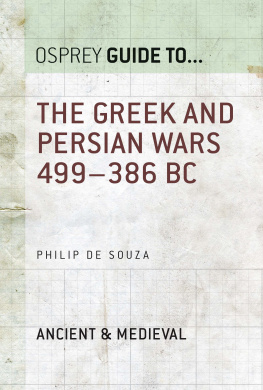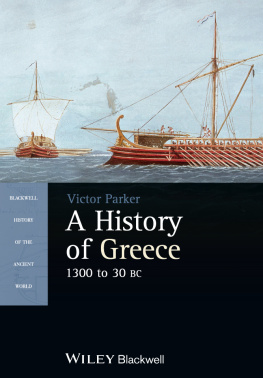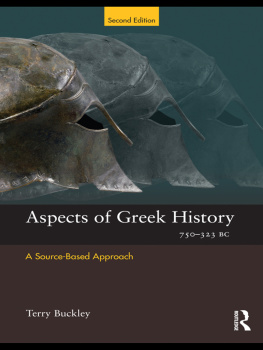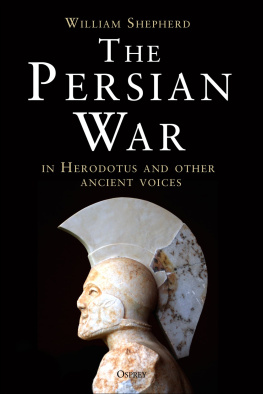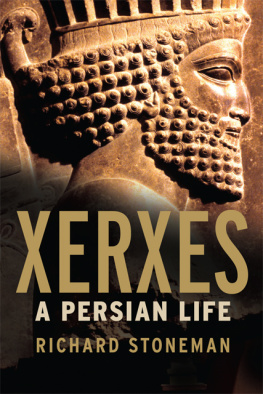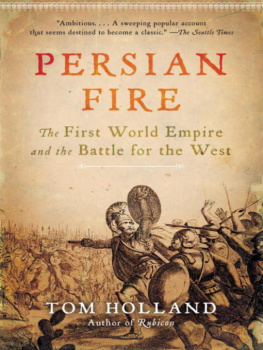Guide To
The Greek and Persian Wars
499386 BC
Philip de Souza

Contents
Introduction
Herodotus and the invention of history
Part of the fascination of the Greek and Persian Wars lies in the fact that they had a great influence on the history of the western world. By preventing the Persians from conquering Greece, the Athenians, the Spartans and other Greeks made it possible for their own unique and highly influential culture to develop independently of Persian dominance. Equally important, however, is the fact that the events of the Persian Wars are recounted in one of the most important and influential works of Classical Greek literature, The Histories of Herodotus. Herodotus was born in the first half of the fifth century BC, in the Greek city of Halikarnassos, which was on the edge of the Persian Empire. He travelled extensively, collecting information from people about themselves and their ancestors. He was able to talk to many who had experienced the events themselves, or who had heard first-hand accounts from others who were involved. The Persian Wars are, therefore, the first wars for which there exists a detailed historical narrative written by someone who was able to obtain detailed and reliable information. Herodotus account can to some extent be supplemented by some other sources, including later Greek and Latin writers and the official documents of Athens and Persia, but he is the most significant source.
The idea of recording great achievements for posterity was not in itself a new one. Egyptian, Babylonian and Assyrian rulers had long been accustomed to setting up memorials to their own greatness, inscribing them with official versions of events. What makes Herodotus work so special is that he sought to go beyond the mere collection of these records and to enquire into their origins and causes. He was consciously looking for explanations of the events. In this respect Herodotus can be seen as part of a much wider intellectual and cultural tradition of philosophical and scientific speculation and enquiry. There is also an element of learning from the events. Herodotus offers his readers his investigations into the origins and causes of the events he narrates, as well as his interpretations of their wider significance. He invites his readers to learn from his Histories, although some of his lessons can seem strange to a modern audience. This is how he introduces his account:
These are the enquiries (the Greek word is histories) of Herodotus of Halikarnassos, which he sets down so that he can preserve the memory of what these men have done, and ensure that the wondrous achievements of the Greeks and Persians (he uses the Greek word barbaroi, meaning foreigners) do not lose their deserved fame, and also to record why they went to war with each other.
Chronology
Kyros the Great becomes king of Anshan in Persia
Kyros takes control of the Median Empire
Kyros conquers Lydia and captures Kroisos
Kyros conquers Babylon
Death of Kyros and accession of Kambyses
Death of Peisistratos; Hippias becomes ruling tyrant of Athens
Kambyses invades Egypt
Death of Kambyses; assassination of Bardiya; Dareios becomes king of Persia; death of Polykrates, tyrant of Samos
520/19 Dareios campaigns against the Skythians
51918 Dareios extends Persian control over Ionians
Hippias expelled from Athens
508/07 Reforms of Kleisthenes; popular democracy established in Athens
Persians attack island of Naxos; Aristagoras visits Athens and Sparta
Ionians, Eretrians and Athenians attack and burn Sardis
Unsuccessful attempt by Ionians to aid Greeks of Cyprus against Persians
49796 Persian counter-offensive against Greeks in Asia Minor; death of Aristagoras
Persians defeat Ionians in the battle of Lade
Persian rule restored in Ionia and eastern Aegean; Themistokles elected archon at Athens
Persians remove tyrants from Ionian Greek states
Dareios demands that all Greek states submit to Persian rule
Aigina defeats Athens in sea battle; Persians capture Naxos; Persians defeated in the battle of Marathon
Death of Dareios; Xerxes becomes king of Persia
Birth of Herodotus
483/82 Ostracism of Aristeides; Athenians begin building fleet of 200 triremes
Xerxes gathers forces at Sardis; Persian envoys sent to Greece; Hellenic League formed at Sparta; Athens and Aigina make peace
Xerxes invades Greece; battles of Artemision and Thermopylai; Xerxes captures Athens; battle of Salamis; Xerxes returns to Asia Minor
Battles of Plataia and Mykale; some Ionians join Hellenic League
Greek expeditions to Cyprus and Byzantion; recall of Pausanias to Sparta
478/77 Formation of the Delian League
45954 Athenian expedition to Cyprus and Egypt
Delian League Treasury transferred to Athens (Tribute Lists begin)
Peace of Kallias between Athens and Persia
43104 Peloponnesian War
Revolt of Kyros the Younger; March of the Ten Thousand
387/86 The Kings Peace
33623 Reign of Alexander the Great
AUTHORS NOTE ON DATES: All dates are BC. The official Athenian year, which was often used by Greek historians as a dating device, began and ended in midsummer. As a result some of the dates in this book are given in the form 478/77, which indicates the Athenian year that began in the summer of 478 and ended in the summer of 477.
Background to war
The coming of the Persians
The enquiries of the Greek historian Herodotus into the wars between the Greeks and the Persians led him to conclude that their origins lay in the rise to power of the Persian Empire under the first of the Achaemenid kings, Kyros the Great. It was Kyros who conquered the kingdom of Lydia in 547. The king of Lydia, Kroisos, had tried to take advantage of the turmoil caused by Kyros seizure of the Median Empire by invading its western territories. Kyros met the Lydian king in battle in Kappadokia and forced him to withdraw. Kroisos stood his army down, thinking that there would be no further fighting, but Kyros pressed on to Sardis, the Lydian capital and laid siege to the city, which he captured after only two weeks. Kroisos had brought the prosperous Greek cities of Ionia on the western coast of Asia Minor under his rule and made them pay tribute to him. After his defeat they acknowledged the rule of Kyros, but many of them participated in a revolt of the Lydians and had to be brought back under Persian control by force. Some of the Greeks chose to flee overseas rather than submit to the Persians. Half the people of Phokaia emigrated to the western Mediterranean, where many Greek cities were already flourishing, and most of the inhabitants of Teos founded a new city at Abdera on the Thracian coast. The larger islands off the coast of Ionia retained their independence for some time, but by 518 the Persians controlled all of Asia Minor and most of the eastern Aegean islands, including Lesbos, Chios and Samos. In keeping with their practice elsewhere in the territories under their control the Persian kings installed or sponsored local aristocrats as rulers of the Greek cities of Asia Minor and the nearby islands. These men were called tyrants, a Lydian word used by the Greeks to describe an individual ruler who was not necessarily an hereditary monarch, but who had not been elected or put in power by overwhelming popular support. These local rulers were answerable to a Persian governor, called a satrap an Old Persian word meaning guardian of the land who normally resided in Sardis. The Persians also exacted tribute from the Ionians, probably at the same level as the Lydian kings before them.

